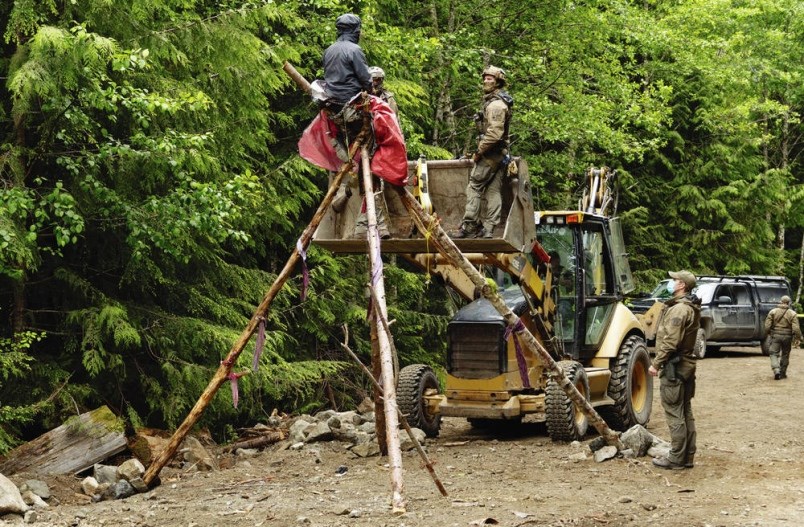Forestry company Teal-Jones wants the attorney general to take over the prosecution of anti-logging protesters at the Fairy Creek blockades.
Teal Jones is applying to the B.C. Supreme Court for an order inviting the attorney general to review the arrests of hundreds of people, now charged with civil contempt of court, and consider the possibility of criminal contempt charges. Unlike civil contempt, criminal contempt is a criminal offence, prosecuted by Crown counsel before a judge.
“The continued existence of the blockades, and the utter disdain for the injunction that they demonstrate, undermines the Court’s authority and undermines the respect for rule of law in B.C,” Teal Jones says in its notice of application.
Since August 2020, members of the Rainforest Flying Squad and other environmental activists have set up moving blockades in their bid to prevent logging and road building in old-growth rainforests.
Teal-Jones was granted an injunction prohibiting road blockades intended to obstruct the logging of old-growth forests in Tree Farm Licence 46, north of Port Renfrew on April 1. Police enforcement began on May 17.
So far, 356 people have been arrested. Of these, 272 were arrested for civil contempt for breaching the injunction.
Teal-Jones is arguing that a large number of people have chosen to publicly and flagrantly breach the civil injunction. It calls the “mass defiance” one of the largest acts of public disobedience since the Clayoquot Sound protests.
The application describes protesters’ attempts to slow down enforcement by chaining themselves to obstacles or other protesters, suspending themselves from trees and chaining themselves inside pipes, sometimes buried underground and encased in concrete.
“On Facebook, Instagram and Twitter, the blockaders boast about breaching the injunction and co-ordinate efforts to further disrupt Teal Cedar’s business and the RCMP’s enforcement operation. Their GoFundMe page has raised more than $640,000,” says the application.
Kathleen Code, spokeswoman for the Rainforest Flying Squad, said she expects the court will find criminal contempt “because we have been at this for a very long time and we’ve dug our heels in.”
“We’re fully prepared for that,” she said.
Teal-Jones is asking the attorney general to take on the cost of the prosecution to relieve it from prosecuting 356 people, which would cut into its profits, said Code. Civil contempt cases are prosecuted by the party that obtained the injunction — in this case Teal-Jones — not the Crown.
“And that’s something they don’t want to do. That’s how I see this whole hearing. It’s an attempt by Teal-Jones to pass the cost of their injunction and the arrests that came out of that over to the taxpayer,” she said.
Legal expert Michael Mulligan said the purpose of civil contempt proceedings is to get compliance with a court order. Criminal contempt involves an element of trying to undermine the court’s authority by breaching an order, intentionally and often in some public way.
“What’s being missed by many engaged in the protest is the court’s consideration is ensuring respect for the rule of law, which is a separate issue from ‘should there be logging here or not,’ ” he said.
Last year, lawyers for the Port of Vancouver asked a judge to invite the B.C. Prosecution Service to assess whether prosecutions for criminal contempt should be pursued against six protesters arrested for breaching an injunction by blockading the port.
Crown lawyers told the judge that although the evidence supported a finding of criminal contempt, they concluded it was not in the public interest to proceed.
However, the judge concluded that the conduct of the protesters amounted to criminal contempt of court.
“The conduct here was open, prolonged and very public defiance of a court order, clearly calculated to lessen public respect for the courts,” wrote Justice Michael Tammen.
The decision may have implications for the Fairy Creek arrests, which have all of the hallmarks of criminal contempt, Mulligan said.
“I think it’s overwhelmingly likely that these civil contempt proceedings will turn into criminal contempt proceedings,” he said.
“It appears that the breach of the court orders are intended to bring attention to the underlying issue. You can’t have people publicly, wilfully breaching orders in order to get attention for the cause. It clearly undermines the rule of law.”
According to the B.C. Civil Liberties Association, the potential penalties for civil and criminal contempt are the same and can include fines or jail. Some first-time offenders convicted of criminal contempt in the Clayoquot Sound protests received jail sentences.



